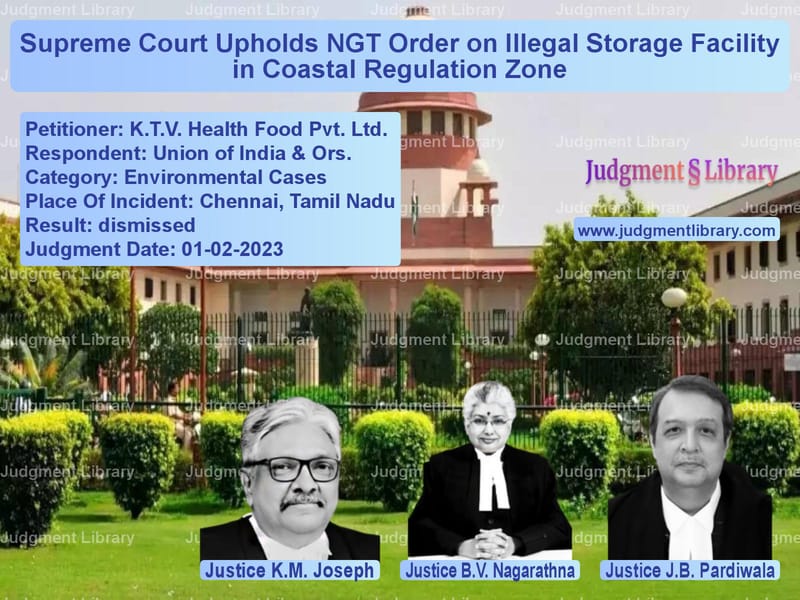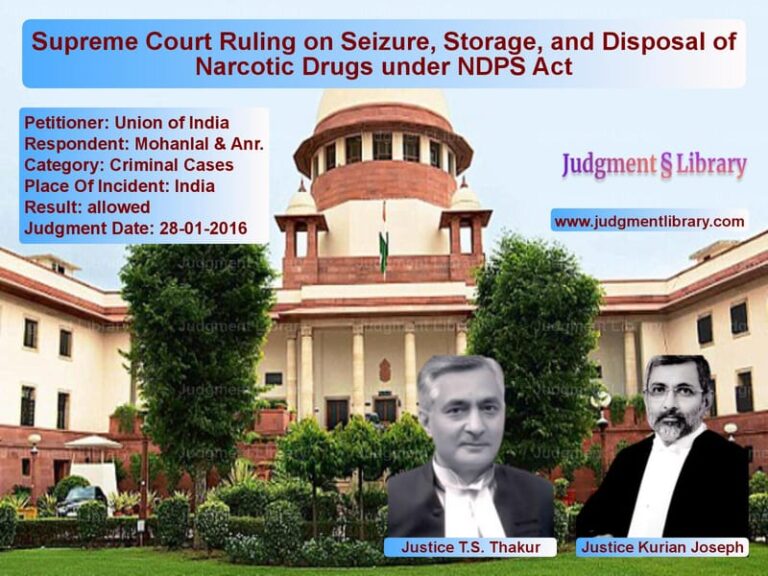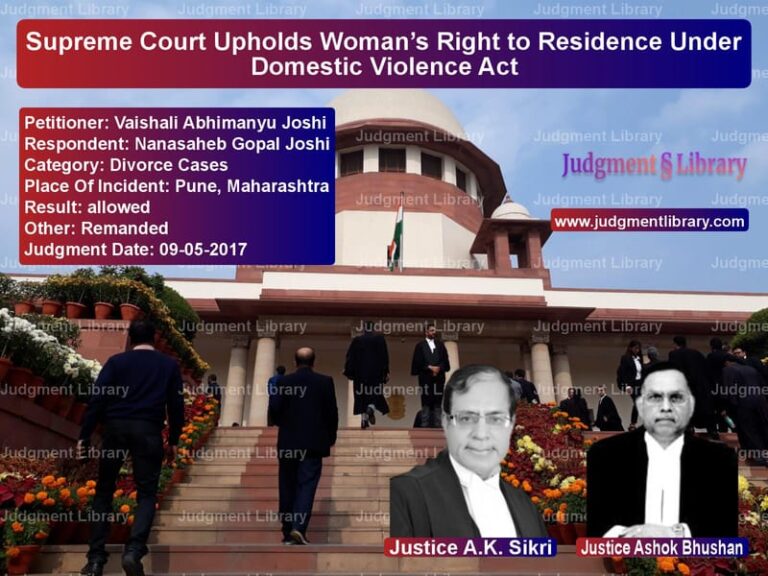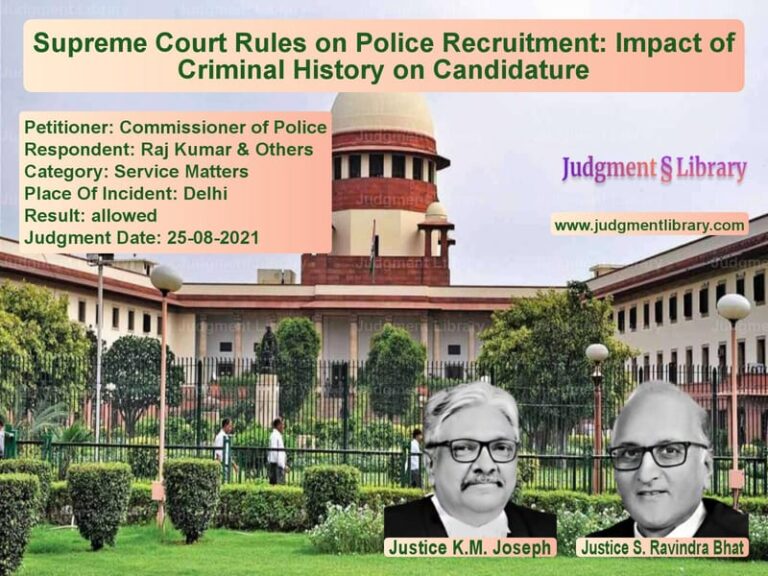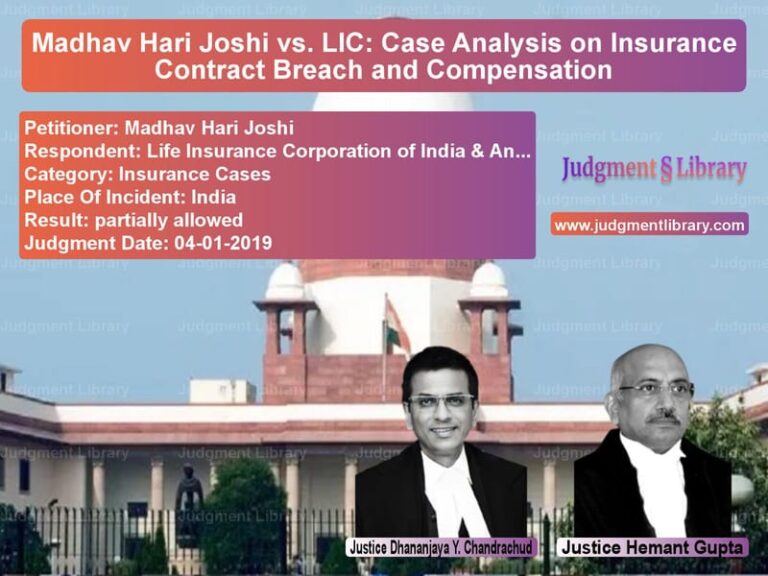Supreme Court Upholds NGT Order on Illegal Storage Facility in Coastal Regulation Zone
The Supreme Court of India, in K.T.V. Health Food Pvt. Ltd. vs. Union of India & Ors., addressed environmental clearance issues for an edible oil storage facility constructed in violation of the Coastal Regulation Zone (CRZ) Notification, 2011. The judgment affirmed the National Green Tribunal’s (NGT) decision directing the demolition of the storage facility and the payment of environmental compensation.
Background of the Case
The case revolved around the construction of an edible oil storage facility by the appellant, K.T.V. Health Food Pvt. Ltd., near Chennai Port. The company imported edible oil and needed a storage facility to reduce tanker congestion at the port. However, the facility was built in a CRZ-II area, raising environmental concerns.
The appellant sought ex post facto environmental clearance from the Ministry of Environment and Forests (MoEF), which was granted in 2019. However, the NGT struck down this clearance, citing violations of the 2011 CRZ Notification. The NGT directed the demolition of the facility and imposed an environmental compensation of ₹25 lakh.
Legal Issues Before the Supreme Court
The Supreme Court examined several critical legal questions:
- Whether the MoEF could grant ex post facto clearance for a facility constructed in violation of CRZ norms.
- Whether the facility’s location outside the notified Chennai Port limits justified its demolition.
- Whether the appellant was entitled to continue operations despite regulatory violations.
Arguments by the Appellant
The appellant, represented by senior counsel, argued:
“The storage facility was necessary to decongest the Chennai Port and facilitate efficient oil imports. The MoEF’s clearance validated the project, and demolition would cause irreparable loss.”
They further contended:
- The facility was constructed with approvals from the Chennai Port Trust, National Highways Authority of India (NHAI), and the Tamil Nadu Pollution Control Board.
- Storage of non-hazardous cargo such as edible oil was permissible under CRZ-II norms.
- The MoEF had the authority to grant post-facto clearance under the 2018 amendment to the CRZ Notification.
Arguments by the Respondents
The respondents, including environmental activists and government authorities, countered:
“The storage facility was built outside the notified port limits, violating the CRZ-II restrictions. Environmental laws must be strictly enforced to prevent encroachments.”
Their key points were:
- CRZ-II regulations allow storage facilities only inside notified ports, and the appellant’s facility was several kilometers away.
- Ex post facto clearance cannot legalize activities violating the fundamental CRZ norms.
- The environmental impact of an unauthorized facility must be considered, and demolition was a necessary deterrent.
Supreme Court’s Observations
The Supreme Court analyzed the provisions of the 2011 CRZ Notification and made key observations:
- Storage of edible oil was permitted only within the limits of a notified port. The appellant’s facility was outside these limits.
- The word “in” the port under CRZ-II meant “inside” the notified area, not adjacent or nearby.
- Ex post facto environmental clearance could not be used to regularize activities that fundamentally violated environmental laws.
The Court emphasized:
“The NGT rightly found that the facility’s location violated CRZ norms. The clearance granted by MoEF was legally untenable.”
Final Judgment
The Supreme Court upheld the NGT’s ruling, stating:
- The appellant’s storage facility must be demolished within six months.
- The appellant must pay ₹25 lakh environmental compensation to mitigate environmental damage.
- The NGT’s order to remove unauthorized pipelines would be subject to a review by the relevant coastal authorities.
Implications of the Judgment
This ruling has significant implications for environmental governance:
- Strict Enforcement of CRZ Regulations: Construction activities must strictly adhere to CRZ guidelines.
- Limits of Ex Post Facto Clearance: Environmental clearances cannot retroactively legalize projects violating core environmental laws.
- Role of the NGT: The decision strengthens the authority of the NGT in environmental matters.
Conclusion
The Supreme Court’s decision in K.T.V. Health Food Pvt. Ltd. vs. Union of India reinforces the sanctity of CRZ laws and sets a precedent against unauthorized coastal constructions. By upholding the NGT’s directive, the Court has underscored the importance of environmental conservation over commercial convenience.
Petitioner Name: K.T.V. Health Food Pvt. Ltd..Respondent Name: Union of India & Ors..Judgment By: Justice K.M. Joseph, Justice B.V. Nagarathna, Justice J.B. Pardiwala.Place Of Incident: Chennai, Tamil Nadu.Judgment Date: 01-02-2023.
Don’t miss out on the full details! Download the complete judgment in PDF format below and gain valuable insights instantly!
Download Judgment: k.t.v.-health-food-p-vs-union-of-india-&-ors-supreme-court-of-india-judgment-dated-01-02-2023.pdf
Directly Download Judgment: Directly download this Judgment
See all petitions in Environmental Cases
See all petitions in Contract Disputes
See all petitions in Public Interest Litigation
See all petitions in Judgment by K.M. Joseph
See all petitions in Judgment by B.V. Nagarathna
See all petitions in Judgment by J.B. Pardiwala
See all petitions in dismissed
See all petitions in supreme court of India judgments February 2023
See all petitions in 2023 judgments
See all posts in Environmental Cases Category
See all allowed petitions in Environmental Cases Category
See all Dismissed petitions in Environmental Cases Category
See all partially allowed petitions in Environmental Cases Category

